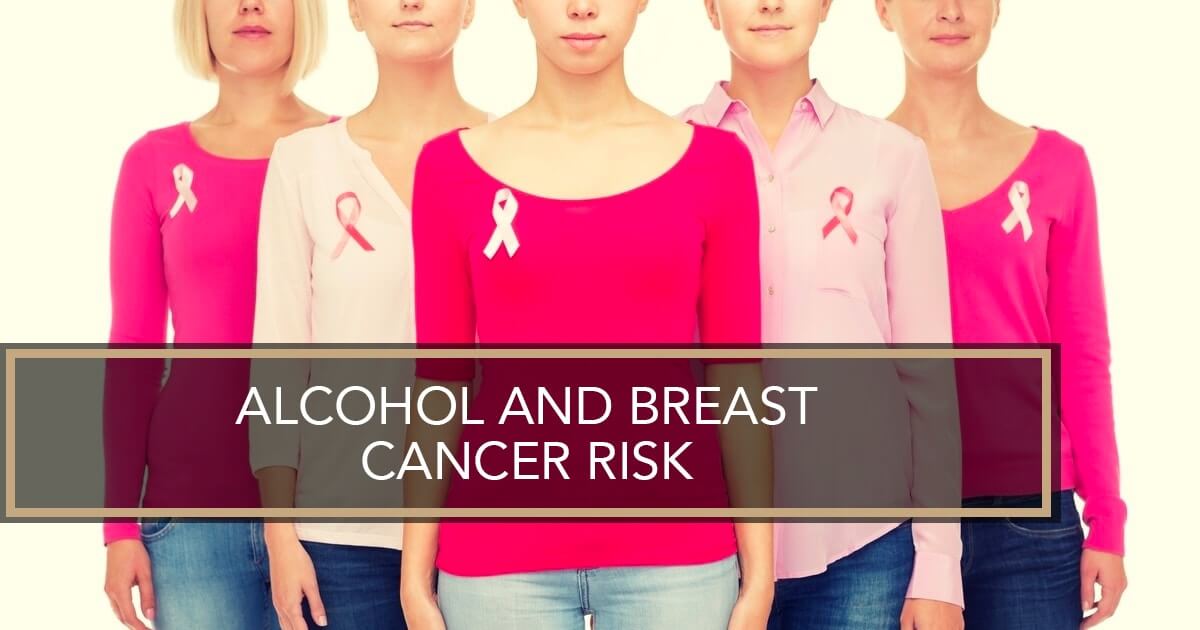October is breast cancer awareness month, and it’s essential to learn about the different risk factors that may increase your chance of breast cancer. An often-overlooked risk factor in breast cancer awareness is the link between alcohol and cancer. Understanding the relationship between alcohol and breast cancer is essential in helping you limit your risks while making decisions in the best interest of your health.
Does Alcohol Cause Cancer?
Choosing to exceed the recommended limit of one alcoholic drink each day will increase your risk of breast cancer. Alcoholic drinks are available in three choices, as a drink is defined as 5 ounces of wine, 12 ounces of beer, and only 1.5 ounces of liquor. Exceeding any one of these limits daily will increase your risk of breast cancer. The chance of getting breast cancer is perilous if you make a habit of drinking more than one alcoholic drink each day.
Over 100 studies have analyzed the link between alcohol and breast cancer in women. These observational studies consistently find that an increase in the risk of breast cancer is related to alcohol intake. While the validity of observational studies is constantly questioned, these studies show a link between alcohol and cancer risk. Some studies show that drinking one glass of wine each day can be beneficial for your heart, but you should avoid any more alcoholic intake to stay healthy.
How Does Alcohol Increase Breast Cancer Risk?
Understanding why alcohol increases the chance of breast cancer is important to help you avoid drinking too much. While scientists don’t have a clear-cut answer to this question, they have a few theories for why alcohol can increase the risk of breast cancer. These reasons involving alcohol and cancer risk include:
- Alcohol can often lead to weight gain due to it being empty calories. Too much fat can increase the risk of cancer.
- Drinking alcohol can often increase the amount of folic acid in your body, increasing your risk of cancer.
- Alcohol can sometimes increase estrogen levels and other hormones that are related to breast cancer.
Does Alcohol and Breast Cancer Impact Men?
Men also need to drink in moderation, but it’s not due to the risk of breast cancer. While it’s possible for men to develop breast cancer, alcohol consumption doesn’t increase this risk. Breast cancer is rare for men, as it often develops due to genetics instead of diet or alcohol. However, alcohol has also been shown to increase the risk for other types of cancer, such as head and neck, liver, and esophageal.
Tips to Decrease the Risk of Breast Cancer
Looking at ways to limit your alcohol intake to reduce your risk of breast cancer is vital for women. Following these simple guidelines can make a big difference in helping you live a healthier life:
- Choose low-calorie drinks to limit weight gain.
- Avoid 100-proof liquor. Researchers believe that the alcohol or ethanol in wine, beer, and liquor is responsible for increasing cancer risk.
- Try to avoid drinking any alcohol.
Breast Cancer Symptoms
The symptoms of breast cancer can occur in a variety of ways. Some people may not have any breast cancer symptoms, while others may have several different symptoms. A few of the most common signs of breast cancer include a swelling or thickening part of the breast. You may also notice a new lump in the underarm or breast. Irritation of breast skin or redness in the nipple area can also be another sign of breast cancer. Any changes in the breast or pain in any area can also be breast cancer symptoms. These signs can also be other conditions that are not cancer-related, but it’s always critical to schedule an appointment with your doctor if you have any of these symptoms.
October is Breast Cancer Awareness Month
Learning about breast cancer symptoms and the link between alcohol and cancer is important in staying proactive against this deadly disease. One of the most critical aspects of breast cancer awareness month is to get as many people involved in learning more about breast cancer while also helping to raise additional funds to support research. More than 3.8 million women in the United States are diagnosed with breast cancer. Learning ways to improve treatment while also reducing risk factors is essential in improving the survival rate.
Closing Thoughts
Breast cancer is an all too common problem for women. Improving breast cancer awareness is essential in staying proactive against this deadly disease. Learning about the relationship between alcohol and cancer is critical in reducing the risks of getting breast cancer. Always scheduling routine medical appointments and mammograms will also allow you to identify breast cancer symptoms to help you get the best treatment as soon as possible.








